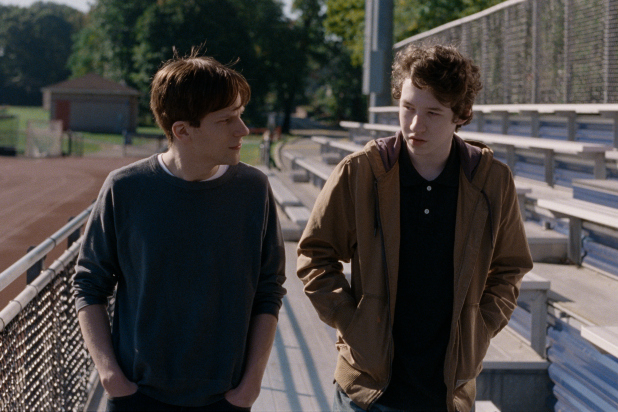
Louder Than Bombs
Director: Joachim Trier
Film review by Brett Champion
When someone you love dies, it can be hard to reconcile the person you remember with the version of that person that lives on in the minds of others. And that’s the central theme of Joachim Trier’s Louder Than Bombs, a father and his two sons struggling to grieve communally for their three remembrances of the same woman.
The family, consisting of Gabriel Byrne as worn out father Gene, Jesse Eisenberg as the hopelessly adrift eldest child, young husband and father Jonah, and Devin Druid as an extraordinarily awkward, troubled teenager Conrad, form the backbone of this film through their interactions with, and memories of, war photo-journalist, wife and mother Isabelle, played superbly by a melancholic Isabelle Huppert. Because, beyond grief and beyond family, this film is really about the intense subjectivity of these characters’ individual realities, which is illustrated by the abrupt shifts between narrative viewpoints. These shifts are jarring and harsh, like a clunky gear-change in an old Datsun, but intentionally so. By wrenching the viewer out of their inhabitation of one character and forcing them to occupy a whole new perspective, Trier makes these characters pointedly, achingly real, granting them an emotional weight that is entirely crucial for this film to have any kind of emotional impact.
While Louder Than Bombs does get off to a slow start, it really hits its stride in the second half, as the disparate threads of the story begin to tie together, a warmth and vitality previously lacking in the cast interaction begins to manifest itself, especially between brothers Jonah and Conrad, who provide some of the most discreetly poignant scenes of the film. The story also benefits from its exploration of Gene’s attempts to carry on with his life by connecting with Conrad and re-enter the dating world.
There is however one major problem with this movie. With a run-time of 1h 49m and four main characters to thoroughly explore and evolve, what should have been a harrowing portrayal of the emotional toll taken on Isabelle as a photographer in active war zones felt rushed, reduced instead to a only a few stills, a montage and a voice over. While this still carried some emotional weight, it felt like an opportunity missed, and the characterisation of Isabelle suffered for it. Similarly, Jonah’s wife is reduced to a distant presence for the vast majority of the film, and while she wasn’t required for any particularly important narrative function, it was a shame to see her stripped of any real agency.
Visually engrossing, with a score that felt touchingly familiar without being tired, Louder Than Bombs overcomes the shortfalls of its first act to conclude strongly with none of the sickly sweet pastiche that usually serves to further divorce sentimental films from the audience and reality. Instead, Trier provides a profoundly humanist ending, concluding the narrative without straying into providing Hollywood fantasy resolution with a deftness and surety that is one of his greatest strengths as a director. Louder Than Bombs is touching without being heartbreaking, melancholy without being melodramatic, and darkly funny without feeling forced or distasteful. In this current cultural climate of bigger, sadder, more expensive Hollywood mores, it’s refreshing to experience a genuine-hearted, hopeful film so seemingly unconcerned with its contemporaries, and for that reason alone it’s worth the price of admission.
“Louder than Bombs” opens 11th August in cinemas around Australia.
We recommend Cinema Nova for anyone in Melbourne 🙂


